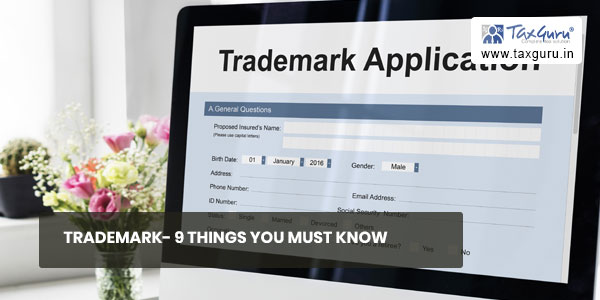Trade Mark is a form of intellectual property which may be registered or not. Intellectual Property comes under ministry of commerce. Trademark is a form of unique word, phrase, company name, design, logo and Image which is different enough from other so that consumers can tell the differences.
Page Contents
- 1. Kinds of Intellectual Property
- 2. Types of Trademark we can register
- 3. Where to Register Trademark
- 4. Process for Trademark Registration
- 5. Fees for Trade Mark Registration
- 6. Duration of Trade Mark
- 7. Types of Trademark Objection
- 8. Advantages of Trade Mark registration
- 9. Recognition of a registered Trade Mark
1. Kinds of Intellectual Property
Intellectual Property stands for the creature, which anyone made in the form of word, image, slogan, logo, patent, copyright and so on
In this article we will talk about the registration process of Trademark
2. Types of Trademark we can register
- Logos
- Symbols
- Word
- Slogan
- Collective Mark
- Series Mark
3. Where to Register Trademark
Firstly, Only a Trademark Agent can register any kind of Trademark and User can Search Trademark on IP India Website of Government.
4. Process for Trademark Registration
- Firstly, applicant has to search the class under which their Trademark is falling.
- Applicant has to search whether their Trademark is not been already registered.
- Applicant has to fill the Form TM-A for registering the Trade Mark along with the fees.
- If any Objection had raised after, applying for Trade Mark then applicant has to reply with in Prescribed Period of Time.

5. Fees for Trade Mark Registration
- For Individuals Rs. 4500
- For Entities Rs. 9000
- For MSMEs Entities Rs. 4500
6. Duration of Trade Mark
The Registration Term of Trade Mark is 10 Years and may be renewed further with the payment of prescribed fees under Trade Mark Act, 1999 and the application for renewal of the Trade Mark to be filed within six months of the expiry of that Trade Mark.
7. Types of Trademark Objection
- Objection: If the examiner is having some doubts and query about your Application. The Examiner will send a Notice and Applicant has to respond within prescribed time mentioned in that notice.
- Opposition: If Third Party have any objection regarding your Trade Mark. They will oppose your application and applicant have to submit their Counter Statement to the registrar in respect of that opposition with 2 Months and based on your statement the registrar may call for a hearing or either dismiss the opposition.
8. Advantages of Trade Mark registration
- Protect Goodwill
- Protect Brand Name or Business Name
- Positive Impression of your Business
- Right to use your identity
- Relief in Infringement
9. Recognition of a registered Trade Mark
- If a Trademark is containing (TM) at the end of their Trade Mark it means that the application is filed for Trade Mark registration and is in under process.
- If a Trademark is containing (R) at the end of their Trade Mark it means that the Trade Mark is Registered.





